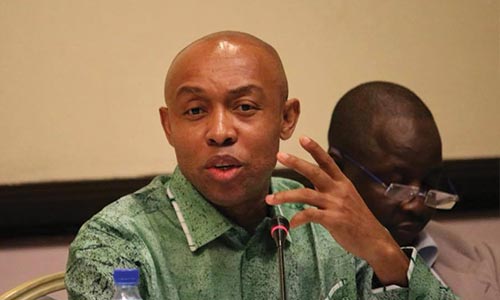In January 1993, Ibrahim Babangida was Nigeria’s military ruler. He was supposedly in the last year of an interminable transition at the end of which he promised to hand over power to an elected civilian administration.
Moshood Abiola was actively canvassing to inherit that mantle. As Chief Justice of Nigeria (CJN), Mohammed Bello was in his fourth year at the apex of the system for resolving disputes between Abiola and Babangida in that process of transition from military to civil rule. He had been CJN since 1987.
At the time, Abiola was also Nigeria’s most influential newspaper publisher under the Concord Group. One of the titles published by the Concord Group was a weekly magazine called African Concord. Its editor was Bayo Onanuga.
In December 1992, Bayo Onanuga’s African Concord ran a cover under the title: “Justice Mohammed Bello: Kick him out now! Lawyers demand.” The story alleged that military ruler Ibrahim Babangida had bribed the Justices of the Supreme Court led by CJN Mohammed Bello with gifts of exotic Mercedes Benz cars. At the time, Mercedes Benz produced the most famous luxury brand of cars in Nigeria.
The Concord Court Drama
This story might have faded but for what followed. Shortly after New Year in 1993, nine of the Justices of the Supreme Court instructed Frederick Rotimi Alade (FRA) Williams, the doyen of Senior Advocates of Nigeria (SAN), to file a case before the High Court of Lagos State against the Concord Group, African Concord, and its editor, Bayo Onanuga.
“Unprecedented… an abdication of his sacred duty as a judicial officer.”
The Concord Group instructed stormy petrel Gani Fawehinmi to represent them. At the Ikeja Division of the High Court of Lagos where the case was tried, Samuel Omotunde Ilori—who would later rise to become the ninth Chief Judge of Lagos—presided.
This case had many sub-plots. For instance, Chief Williams’s youngest son, Tokunbo, who would shortly thereafter become a SAN himself, was married to the daughter of the presiding judge, Olusola. When Gani Fawehinmi asked the judge to disqualify himself, he declined, describing the request as “unprecedented” and an invitation to “an abdication of his sacred duty as a judicial officer.”
The Secretary to the Government of the Federation (SGF) at the time, Alhaji Aliyu Mohammed, the Wazirin Jema’a, was a witness. In cross-examining him, Gani Fawehinmi asked for his qualifications. Reluctantly, the SGF replied that he was the proud holder of a Teachers Grade 2 certificate. Gani spat out to courtroom laughter: “Teacher’s Grade Two certificate, and he rose through the ranks to become the SGF!”
Ultimately, the case was settled when Abiola elected to apologise to the Supreme Court Justices, who then instructed Chief Williams to withdraw it. In response, Bayo Onanuga resigned as editor of Chief Abiola’s African Concord.
From Judicial Independence to Dependency
The underlying issue in that case was judicial independence and integrity. Thirty-two years ago, it was an affront to suggest judges could be impressed with cars or placed on political payrolls. Today, things are different. Senior judicial figures flaunt ties to politicians and lean on that to subvert authority among judges and courts.
“Military rule had a corrosive effect” on the judiciary.
When Mohammed Bello retired as CJN in 1995, Mohammed Lawal Uwais succeeded him. Uwais had been affronted by the 1992 car allegations. He understood that “military rule had a corrosive effect” on the judiciary, but he would not cede ground on personal and institutional integrity.
Until his retirement in June 2006, the spectacle of politicians gifting cars to judges was rare in Nigerian public life. That changed under his successors. In less than two decades, judges have been reduced to beggars for SUVs. The origins are murky, but Lagos State appears to be the index case.
The Turning Point in 2007
A significant moment came in October 2007, when Governor Babatunde Raji Fashola, SAN, presented 18 cars to Magistrates in Lagos State. Daily Champion reported the event under the headline: “Lagos Government Dashes 18 Cars to Magistrates.”
Governor Fashola declared: “Our commitment to continuously improve the welfare package and conditions of service of judicial officers in the state places a reciprocal demand on magistrates to display professionalism, integrity and above all a good work ethic.”
The issue was not welfare but the symbolism. The presentation made the judiciary appear beholden to politicians. The Judicial Service Commission (JSC) oversees magistrates and should have received funds for their needs. Instead, the governor staged a public presentation, raising doubts about trust in judicial financial management.
“Lagos Government Dashes 18 Cars to Magistrates.”
This view was supported years later when former Justice of the Supreme Court, Ejembi Eko, accused heads of courts in 2024 of “vandalisation of the judiciary budget” despite controlling “enormous budgetary resources.”
Since 2007, governors have purchased countless cars for judges across the country. Whether this has improved judges’ welfare is arguable, but the integrity of courts is visibly weakened.
Budget Rules Ignored
The NJC Guidelines require proof of adequate budget for judges’ housing and cars before appointments are made. If politicians still dole out cars while the NJC looks away, the implications are obvious. Judges risk being compromised by those they ought to hold accountable.
The opinions expressed in this article are strictly those of the author and do not necessarily align with the views of JolibaLive News! or any of its staff members. The author is in no way associated with this online news blog.
Rate, Like 👍, Comment💬, share this article, and join us on our social media handles. You can also Submit your own story to get featured and earn rewards!







